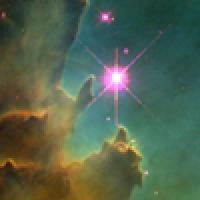
Plus Advent Calendar Door #5: Riddles of the Universe

Image courtesy NASA.
The best thing about Christmas are the presents! And if it hadn't been for that blazing star guiding the three magi to baby Jesus, laden with gold, frankincense and myrrh, then we might not have that present giving tradition at all.
So for Door #5 of the Plus Advent calendar we turn our gaze to the stars and muse on the biggest mysteries of the Universe. Find out what happened before the Big Bang, whether we will one day be able to travel through time, whether those mysterious constants of nature really are constant, how gravity works, and unravel the secrets of dark matter and dark energy.
You can also find out what the greatest star gazers of them all, the Hubble Space Telescope, has discovered, whether there's life on distant planets, why the Universe might just be an illusion, and why a single number holds the key to it all.
Anonymous
Compact thoughts on the Door#5 muses:
before the Big Bang - enough motion to create enough friction to cause the Bang. How? or maybe a better question is Why?
travel through time - we have always traveled though time, someone said "time waits for no man" we can now only go in one direction, the real trick will be to control then change direction.
constants of nature - appears to most common men the the only real constant is change, everything else is dependent on, or at the very least responding to it.
For many of us lay people these muses lead to a never ending...Why?
Thank you for the opportunity to to explore, the Plus Advent Calendar is an awesome idea for young and old alike.
Harriet Raymond